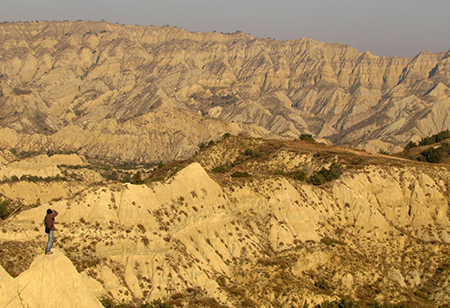Georgia’s Vashlovani Protected Area receives European conservation award

One of Georgia’s Protected Areas boasting a remarkable range of landscapes has today joined more than 70 protected areas in several European countries to receive a top European award for conservation.
Eastern Georgia’s Vashlovani Protected Areas was awarded the European Diploma for Protected Areas for its preservation of biological, geological and landscape diversity at a special ceremony today.
The Council of Europe granted Georgia the prestigious award for five years.

Eladio Fernandez Galiano of the Council of Europe awarded the diploma to Georgia’s Environment Minister Gigla Agulashvili. Photo from Georgia's Environment Ministry.
At the Vashlovani National Park today Eladio Fernandez Galiano of the Council of Europe awarded the diploma to Georgia’s Environment Minister Gigla Agulashvili.
During the ceremony the two officials released pheasants and let them fly over the Vashlovani Protected Areas. The pheasants were raised in a bird breeding facility within the Kolkhetian Pheasants Restoration in their Natural Habitats project.
The project was held during 2014 and 2015 thanks to Global Environment Foundation (GEF) financing and support from the United Nations Development Programme (UNDP).
Within the project a special incubator building was built where 300 pheasants were hatched last year. This year about 200 Kolkhetian pheasants were incubated and hatched in the laboratory, the majority of which have been released.

The pheasants were released today to fly over the Vashlovani Protected Areas. Photo from Georgia's Environment Ministry.
Georgia applied for the European Diploma for Protected Areas in March 2014 and the Council of Europe’s Committee of Ministers decided to award Vashlovani Protected Areas with the award in June this year.
The award recognised each area’s outstanding scientific, cultural or aesthetic qualities however the area must also encompass a suitable conservation scheme.
 Tweet
Tweet  Share
Share